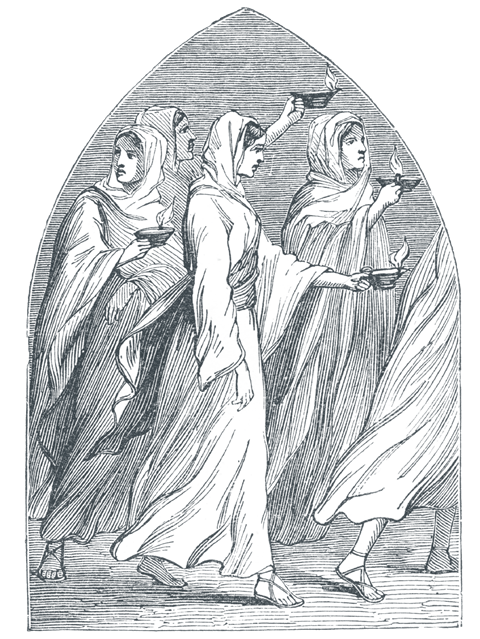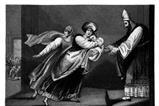Elaine Storkey explains who the ‘foolish virgins’ were and why their story is still so relevant to us today
Study passage: Matthew 25:1-13
Some things that we take for granted in one culture are often difficult to understand in another. That’s because our ways of doing things can be very different from each other, even though we don’t always realise it.
Once, when American friends were staying with us in the UK I suggested we all took their children to a pantomime. They looked blank. “What’s that?” they asked. Trying to explain that it was a kind of comic love story on a stage wasn’t easy.
“Well, there’s a beautiful principal girl who falls in love with a principal boy (but played by a girl) while a middle-aged dame (played by a man) argues with the audience and an evil villain tries to cause havoc.
Lots of other characters in funny clothes enjoy themselves singing and dancing.” When I went on to describe how the audience had to boo the villain, warn the principals (“he’s behind you!”) and constantly correct the dame, I realised my American friend was beginning to think that British people were decidedly odd. (“Oh no we’re not!”)
So if we can’t always grasp what another culture is up to in our own day and age, we shouldn’t be surprised when we come across a story in the Bible that sounds a bit peculiar to our ears.
The story Jesus tells about the ten virgins is an example. His listeners would have understood it easily because the events Jesus described were perfectly familiar to them. The underlying meaning of the parable is clear too, because Jesus made that obvious. But the details still require quite a bit of explanation for our modern Western minds.
The context of the parable
The story is about a wedding, where ten virgins are waiting for the bridegroom. That’s the first puzzle: why ten virgins? Which of them is the bride? The answer is none of them because ‘virgin’ simply means ‘young woman’ and they are all wedding guests of the bride.
Some translations call them ‘bridesmaids’ to make it easier for us to make the connection, but it might be more accurate to call them ‘groomsmaids’ because their responsibilities were more to the bridegroom than to the bride.
Weddings were big events in those cultures. When a couple married, the whole community was involved and the party could last for days. But there wasn’t a particular starting time.
The wedding began when the bridegroom arrived at the bride’s house (remember, it was a patriarchal society and the focus was on the man). He may have had to travel some distance so it was quite normal for the guests and the bride to be kept waiting for hours, sometimes beyond nightfall.
The responsibility of the ten women friends of the bride was to look out for the groom’s coming and then escort him to her house for the wedding to begin. If it was dark, they needed lamps so they could light up his way.
When the bridegroom’s arrival was signalled, the young women, along with all the other guests, would rush to meet him and if it was night-time, would immediately light their lamps and trim the wicks.
These lamps consisted of a wick in a round oil container that was placed in a deep bowl and then fastened into a long wooden pole. Before the pole was lifted up, the lamp bearer would trim the wick so it could burn brightly.
Although no one knew when the hour would come, it was likely to be sudden and the spectacular ‘lighting-up ceremony’ would mark the beginning of the celebration. At the house, the bride and groom would be dressed as royalty and for days after the wedding event, hospitality would flow.
In this story, however, the waiting had gone on way into the night, and the bride’s friends were struggling to stay awake. Being so drowsy, many of them dropped off to sleep. Five of the ten hadn’t prepared themselves properly: they didn’t have oil for their lamps.
They couldn’t borrow oil from the other five, who had prepared carefully for the groom’s arrival, because each one of them needed her own oil. So, having no way of going to greet the bridegroom or escorting him to his bride, they set off at that late hour to try to buy oil elsewhere. It was all far too last-minute.
When they returned, they found the wedding celebrations had begun, but the door was shut against them so they missed the event. Not only that, they were left out of the glorious festivities that followed too.

The parable’s message
Jesus’ reference in his parable was clear. He was talking about the end times that were to come. Speaking to his Jewish audience, he was telling them that the whole history of Israel was the preparation for the coming of God’s Son.
And, through the prophets, through Jesus’ teaching as well as through signs and wonders, God had shown them that this time had already come. Yet, though God had warmly invited them to rejoice and celebrate, many had not done so.
But Jesus would come back at an unknown hour and his people must be ready. Their unpreparedness and indifference would result in exclusion when he returned again.
What does the parable mean to us today?
We live in a time when people are very aware of the fragility of human life. Wars, pandemics, climate change, water shortages, along with viruses that keep attacking our bodies, all bring us face to face with our mortality.
We also see the threat to our planet as the earth’s temperature rises constantly and draws close to the point of no return. With all this as our background, Christians especially ought to be thinking of Christ’s return, even if our secularised world doesn’t give it a thought.
So this parable is very relevant to us. And three lessons leap out of it. The first is that the young women were very lax on preparation. They let things slip and thought it wouldn’t matter.
We know ourselves how much preparation we put into things that are important to us, just so that everything will go well and we won’t be flustered and anxious later. Preparation for an encounter with God is even more crucial for us than preparation was for the young women waiting for the bridegroom.
We need to ask the Holy Spirit to search our hearts and help us to get to know ourselves better. As Psalm 139 says, we need to know if there is anything wrong in us that God needs to forgive or heal (vv23-24).
Secondly, the young women had no oil and when they tried to get some from other people, they failed. It reminds us that we too cannot get some things second hand or through borrowing, but need to own them ourselves.
For example, someone might tell me that a meal tastes good, but I have to taste the meal with my own tongue and taste buds to really know whether it’s something I like. Similarly, I can’t borrow someone else’s life history, or reputation, but I have to live with my own.
Most of all, none of us can borrow a relationship with God. We need our own. If my friend, sister or family member is a strong Christian, I can’t rely on that for my own life. The wonderful thing is that God invites each of us into relationship to receive his love and forgiveness.
So, if you’ve not put your trust in Jesus yet, or experienced God’s love personally, this might be a good time to start.
Thirdly, there was an urgency in the parable about being ready for what was to come. We need to recognise that, sooner or later, we also face an ending: either through the return of Jesus or through the closure of our own life span.
Like the guests waiting for the bridegroom, we have no idea when that will be. Jesus’ message throughout these last chapters in Matthew’s Gospel is that no one knows the hour when these things happen, so we shouldn’t be led astray by false prophets.
But we should be aware that endings will come to each one of us. And it will be far too late to try to get ready when everything is underway.
The consequences for the five unprepared young women who tried to borrow their way through the problem was that they found the door shut and missed a great party. They had to listen to the merriment while on the outside.
The consequences for us of being unready for Christ’s return are more serious. Jesus used the parable to urge us against being lulled into complacency. The devil’s best way of damaging our faith (and life) is not to try to persuade us that there is no God. It is to persuade us that there is no hurry.
































